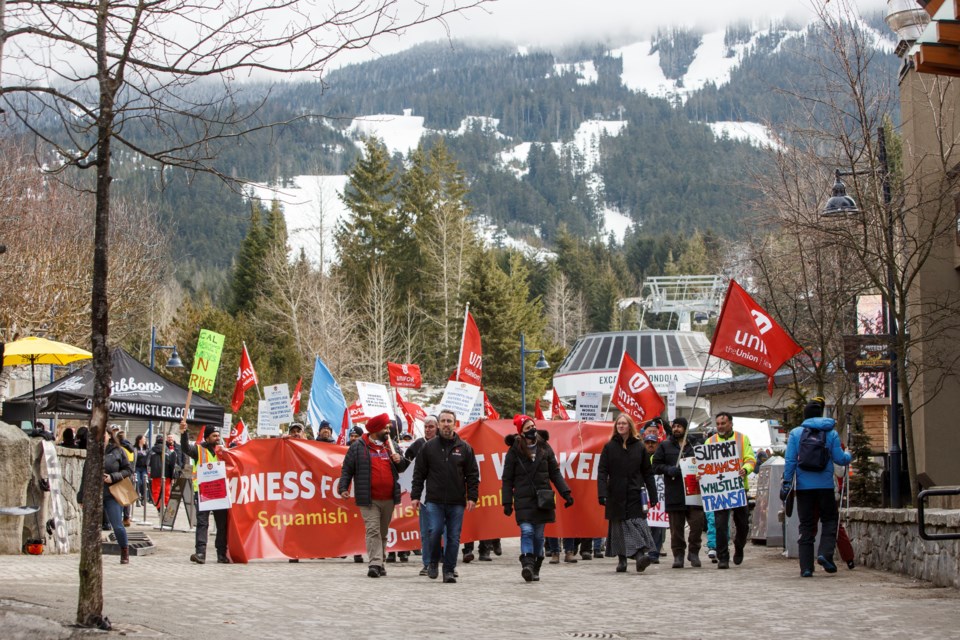On Wednesday, May 11, the parties involved in the Sea to Sky transit strike resumed negotiations after weeks of not meeting. By the end of the night, they had called off talks once more, extending a bitter dispute that has shut down transit services in the corridor for 15 weeks.
Yesterday, when employer Pacific Western Transportation (PWT) and Unifor Local 114 resumed talks for the first time since March alongside mediator Dave Schaub, it represented only the fourth full day of negotiations since the strike began Jan. 29.
Wage parity remains the major hurdle to cross.
“We discussed various options and multiple timelines, but, as they have from the beginning, PW Transit again rejected any proposal for a roadmap that gets Sea to Sky transit workers’ wages up to today’s Coast Mountain Bus Company levels,” said Gavin McGarrigle, Unifor’s Western regional director, in a release.
Unifor has consistently called for transit workers’ wages to be in line with their counterparts in Victoria and Vancouver, the latter where Coast Mountain Bus Company workers ratified a one-year contract extension in March that included a three-per-cent wage hike for all operators and a five-per-cent bump for skilled tradespeople.
On Wednesday, PWT offered two settlement package options: One containing an agreement on wage increases in Year 1 and 2 of the deal, along with meeting the union’s demands on pension and benefits. This package also included an agreement that both parties would enter binding arbitration regarding wage increases in Year 3, 4 and 5 of the deal.
PWT said the second option contained higher guaranteed wage increases over the span of the five-year deal and a conversion from the company’s contribution pension plan to the union’s preferred, defined benefit pension plan.
“We were disappointed when the Union informed the Company that they weren’t prepared to recommend either option to their members and walked away from the table,” PWT said in a release.
“At this time, we are exploring all remaining options to restore transit as quickly as possible.”
The union, in turn, said for the first time it offered to delay wage parity with Coast Mountain Bus Company workers until April 2024, but said PWT refused.
Another option presented by Unifor would have slightly modified one of PWT's recent offers of a signing bonus, but converted to wages spread out over the five years of the agreement, “leaving the parties only $0.25 per hour apart on transit drivers’ wages in 2024,” Unifor said. The union said PWT turned down this offer.
Unifor also contended that it proposed another day of mediation “in the near future,” which PWT also reportedly refused.
There are no future negotiations scheduled.
Whistler Mayor Jack Crompton expressed his frustration over negotiations falling apart yet again in a post to Facebook Thursday, May 12.
“Talks break off after less than a day!!!!” he wrote. “Unifor Canada and PWTransit, you have proved your representatives are not capable of getting you a deal by negotiation—it is now time for independent binding arbitration.”
On Tuesday, Whistler council discussed a nuclear option that was ultimately voted down. With no buses on the roads for more than 100 days now, Councillor Ralph Forsyth proposed giving BC Transit—which subcontracts PWT to manage transit services in the region—180-day notice that it would be terminating its contract, stop paying lease fees, and launch its own community shuttle.
That motion, and a subsequent one to explore the legal viability of these three options, failed on the eve of talks resuming.
The province also has the ability to legislate buses back on the road, which the BC Liberals did in 2001 to end the 123-day transit strike in Metro Vancouver, still the longest transit shutdown in B.C. history.




